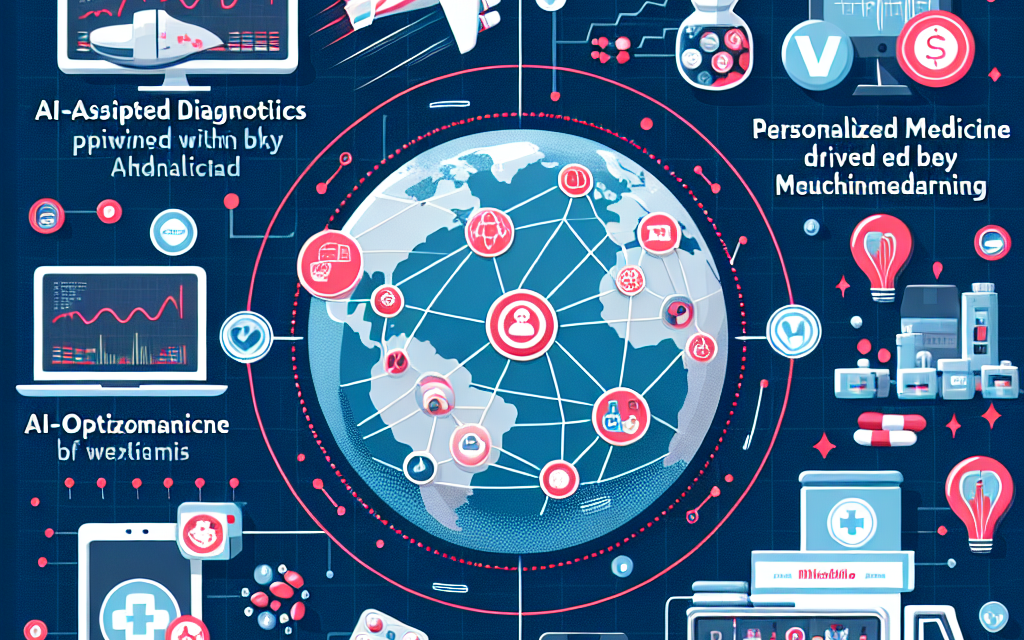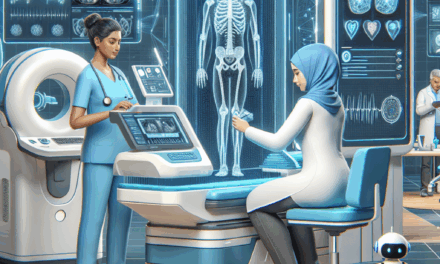Exploring AI Trends in Healthcare for 2025
The healthcare industry is undergoing a transformative shift, driven by advancements in artificial intelligence (AI). As we look toward 2025, it is essential to explore the trends that are shaping the future of healthcare through AI technologies. This article delves into five key subtopics: AI in diagnostics, personalized medicine, operational efficiency, patient engagement, and ethical considerations. Each section will provide insights into how AI is revolutionizing healthcare and what we can expect in the coming years.
AI in Diagnostics
One of the most significant impacts of AI in healthcare is its application in diagnostics. AI algorithms are increasingly being used to analyze medical images, interpret lab results, and even predict disease outbreaks. By 2025, we can expect AI to play an even more critical role in diagnostics, enhancing accuracy and speed while reducing costs.
AI-powered diagnostic tools utilize machine learning algorithms to analyze vast amounts of data. For instance, deep learning techniques have shown remarkable success in interpreting medical images such as X-rays, MRIs, and CT scans. A study published in the journal *Nature* found that an AI system developed by Google Health outperformed human radiologists in breast cancer detection, achieving a 94.6% accuracy rate compared to 88.0% for human experts.
Moreover, AI can assist in diagnosing diseases at an earlier stage. For example, AI algorithms can analyze patterns in patient data to identify risk factors for conditions like diabetes or heart disease. By leveraging electronic health records (EHRs) and wearable device data, AI can provide healthcare providers with actionable insights, enabling them to intervene before a condition becomes severe.
- Case Study: Zebra Medical Vision – This company uses AI to analyze medical imaging data, providing radiologists with automated insights that enhance diagnostic accuracy.
- Example: PathAI – PathAI focuses on pathology diagnostics, using AI to improve the accuracy of cancer diagnoses by analyzing tissue samples.
- Statistics: Market Growth – The global AI in healthcare market is projected to reach $45.2 billion by 2026, growing at a CAGR of 50.2% from 2021 to 2026.
As AI continues to evolve, we can expect more sophisticated diagnostic tools that not only improve accuracy but also reduce the burden on healthcare professionals. By 2025, AI-driven diagnostics will likely become a standard practice in hospitals and clinics, leading to better patient outcomes and more efficient healthcare delivery.
Personalized Medicine
Personalized medicine, or precision medicine, is another area where AI is making significant strides. By analyzing genetic, environmental, and lifestyle factors, AI can help tailor treatments to individual patients, improving efficacy and minimizing side effects. As we approach 2025, the integration of AI in personalized medicine is expected to become more prevalent.
AI algorithms can analyze genomic data to identify mutations and variations that may influence a patient’s response to specific treatments. For instance, AI can help oncologists determine the most effective chemotherapy regimen based on a patient’s genetic profile. A study published in *The New England Journal of Medicine* demonstrated that AI could predict the response of breast cancer patients to specific therapies with high accuracy.
Furthermore, AI can enhance drug discovery processes by predicting how different compounds will interact with biological systems. This capability can significantly reduce the time and cost associated with bringing new drugs to market. For example, Atomwise uses AI to screen millions of compounds for potential drug candidates, accelerating the discovery of treatments for diseases like Ebola and multiple sclerosis.
- Case Study: Tempus – Tempus uses AI to analyze clinical and molecular data to help oncologists make more informed treatment decisions.
- Example: 23andMe – This genetic testing company leverages AI to provide personalized health insights based on genetic data.
- Statistics: Market Potential – The personalized medicine market is expected to reach $2.4 trillion by 2025, driven by advancements in genomics and AI technologies.
By 2025, personalized medicine powered by AI will likely become a cornerstone of healthcare, enabling providers to deliver targeted therapies that improve patient outcomes and reduce healthcare costs. The shift toward personalized treatment plans will also empower patients to take an active role in their healthcare journey.
Operational Efficiency
AI is not only transforming patient care but also enhancing operational efficiency within healthcare organizations. By automating routine tasks and optimizing workflows, AI can help healthcare providers reduce costs and improve service delivery. As we move toward 2025, the focus on operational efficiency through AI will become increasingly important.
One of the primary applications of AI in operational efficiency is in administrative tasks. AI-powered chatbots can handle patient inquiries, schedule appointments, and manage billing processes, freeing up staff to focus on more complex tasks. For example, the chatbot developed by Buoy Health can guide patients through symptom checking and direct them to appropriate care options, reducing the burden on healthcare providers.
AI can also optimize resource allocation within healthcare facilities. Predictive analytics can forecast patient admissions, allowing hospitals to manage staffing levels and bed availability more effectively. A study published in *Health Affairs* found that hospitals using AI-driven predictive analytics reduced patient wait times by 20% and improved bed utilization rates.
- Case Study: Mount Sinai Health System – This health system implemented AI algorithms to predict patient admissions, resulting in improved operational efficiency and reduced costs.
- Example: Qventus – Qventus uses AI to automate hospital operations, helping providers manage patient flow and reduce delays.
- Statistics: Cost Savings – AI-driven operational improvements could save the healthcare industry up to $150 billion annually by 2026.
By 2025, we can expect AI to play a crucial role in streamlining healthcare operations, leading to improved patient experiences and reduced costs. The integration of AI into administrative processes will allow healthcare providers to focus on delivering high-quality care while enhancing overall efficiency.
Patient Engagement
Engaging patients in their healthcare journey is essential for improving outcomes and satisfaction. AI technologies are increasingly being used to enhance patient engagement through personalized communication, education, and support. As we approach 2025, the role of AI in fostering patient engagement will continue to grow.
AI-driven platforms can provide patients with tailored health information based on their medical history and preferences. For instance, chatbots can offer personalized health tips, medication reminders, and answers to common questions, empowering patients to take charge of their health. A study published in *JAMA Internal Medicine* found that patients who interacted with AI chatbots reported higher satisfaction levels and better adherence to treatment plans.
Moreover, AI can facilitate remote monitoring and telehealth services, allowing patients to receive care from the comfort of their homes. Wearable devices equipped with AI algorithms can track vital signs and alert healthcare providers to potential issues, enabling timely interventions. For example, the Apple Watch has integrated features that monitor heart rate and detect irregularities, prompting users to seek medical attention when necessary.
- Case Study: Babylon Health – This telehealth platform uses AI to provide patients with personalized health assessments and connect them with healthcare providers.
- Example: MySugr – MySugr is an app that uses AI to help diabetes patients manage their condition through personalized insights and support.
- Statistics: Telehealth Growth – The telehealth market is projected to reach $459.8 billion by 2030, driven by increased patient demand for remote care options.
By 2025, AI will likely play a pivotal role in enhancing patient engagement, leading to improved health outcomes and greater patient satisfaction. The ability to provide personalized support and remote monitoring will empower patients to take an active role in managing their health.
Ethical Considerations
As AI continues to permeate the healthcare landscape, ethical considerations surrounding its use are becoming increasingly important. Issues such as data privacy, algorithmic bias, and accountability must be addressed to ensure that AI technologies are used responsibly and equitably. By 2025, the healthcare industry will need to establish robust ethical frameworks to guide the development and implementation of AI solutions.
Data privacy is a significant concern in healthcare, particularly as AI systems rely on vast amounts of patient data to function effectively. Ensuring that patient information is protected and used ethically is paramount. The Health Insurance Portability and Accountability Act (HIPAA) sets standards for data privacy in the U.S., but as AI technologies evolve, additional regulations may be necessary to address emerging challenges.
Algorithmic bias is another critical issue that must be addressed. AI systems can inadvertently perpetuate existing biases present in training data, leading to disparities in care. For example, a study published in *Science* found that an AI algorithm used in dermatology was less accurate in diagnosing skin conditions in patients with darker skin tones. To mitigate this risk, developers must prioritize diversity in training datasets and continuously monitor AI systems for bias.
- Case Study: IBM Watson – IBM Watson faced criticism for its oncology recommendations, which were found to be biased due to a lack of diverse training data.
- Example: AI Fairness 360 – This open-source toolkit developed by IBM helps organizations detect and mitigate bias in AI models.
- Statistics: Public Trust – A survey by Accenture found that 83% of consumers are concerned about data privacy in healthcare AI applications.
By 2025, addressing ethical considerations will be crucial for the successful integration of AI in healthcare. Establishing clear guidelines and fostering transparency will help build public trust and ensure that AI technologies are used to benefit all patients equitably.
Conclusion
The integration of AI in healthcare is poised to revolutionize the industry by 2025. From enhancing diagnostics and personalizing medicine to improving operational efficiency and patient engagement, AI technologies are set to transform how care is delivered. However, as we embrace these advancements, it is essential to address the ethical considerations that accompany them.
As we look ahead, the key takeaways from this exploration of AI trends in healthcare include:
- AI is significantly improving diagnostic accuracy and speed, leading to better patient outcomes.
- Personalized medicine powered by AI is enabling tailored treatment plans that enhance efficacy and reduce side effects.
- Operational efficiency is being enhanced through AI automation, allowing healthcare providers to focus on patient care.
- AI technologies are fostering greater patient engagement, empowering individuals to take control of their health.
- Ethical considerations surrounding data privacy and algorithmic bias must be addressed to ensure responsible AI use in healthcare.
As we move toward 2025, the potential of AI in healthcare is immense. By harnessing these technologies responsibly, we can create a more efficient, equitable, and effective healthcare system that benefits all patients.





